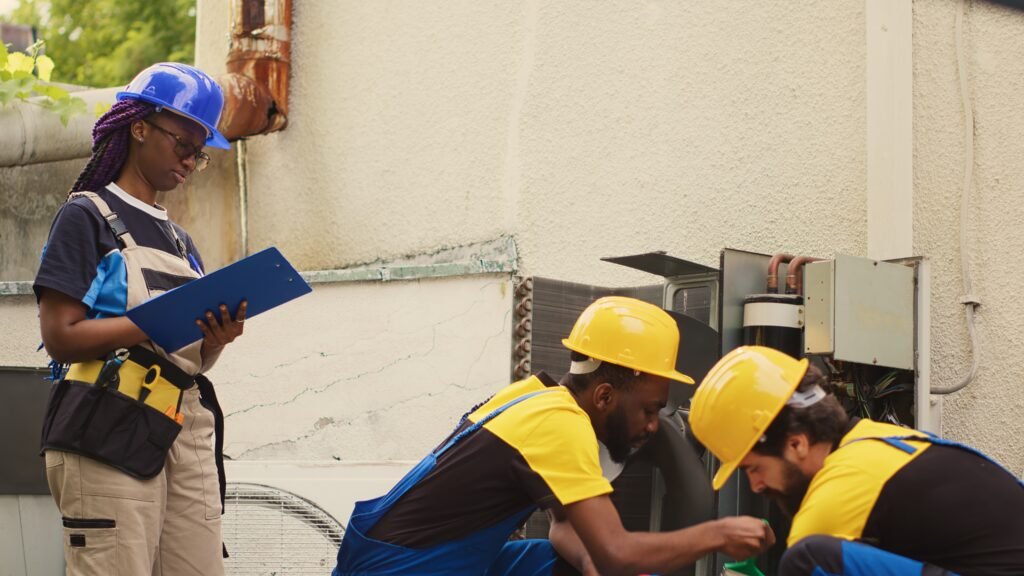If you’ve ever opened your electricity bill during summer or winter and felt shocked by the number, you’re not alone. Heating and cooling usually account for nearly half of a home’s total energy use. That means if your HVAC system isn’t running efficiently, your bills will show it.
The good news? A little maintenance can go a long way in cutting costs, improving comfort, and extending the life of your system. In this guide, we’ll cover practical, easy-to-follow HVAC maintenance tips that help you save money month after month.
Why HVAC Maintenance Matters
Your HVAC system works hard year-round to keep your home comfortable. Without regular care, parts wear out faster, airflow becomes restricted, and energy use climbs.
Benefits of regular maintenance include:
- Lower energy bills.
- Longer system lifespan.
- Fewer unexpected breakdowns.
- Better indoor air quality.
- A more comfortable, consistent temperature in your home.
Think of it like maintaining your car, oil changes keep your engine running smoothly. HVAC maintenance does the same for your heating and cooling system.
1. Change Your Air Filters Regularly
One of the easiest and most overlooked, tasks is changing your air filter. A clogged filter makes your system work harder to push air through, which wastes energy.
- How often? Every 1–3 months, depending on pets, allergies, and dust levels.
- Why it matters: Clean filters improve airflow, lower bills, and reduce strain on your system.
- Pro tip: Buy filters in bulk so you always have extras on hand.
A dirty filter alone can increase your energy use by 5–15% that’s money straight out of your pocket.
2. Schedule Seasonal HVAC Tune-Ups
Professional tune-ups are like check-ups for your HVAC system. Ideally, you should schedule service twice a year: once in the spring for your AC, and once in the fall for your furnace or heat pump.
During a tune-up, a technician will:
- Clean the coils and check refrigerant levels.
- Inspect and tighten electrical connections.
- Lubricate moving parts.
- Test airflow and thermostat settings.
This helps catch small issues before they turn into costly breakdowns and keeps your system running at peak efficiency.
3. Seal Air Leaks and Insulate
Even the best HVAC system can’t do its job if your home is leaking cool or warm air.
- Check for leaks: Around doors, windows, and ductwork.
- Fix it: Use weatherstripping, caulk, or insulation to seal gaps.
- Why it matters: Proper sealing can reduce heating and cooling costs by up to 20%.
Duct leaks alone can waste 20–30% of the air moving through your system. That’s like throwing money out the window.
4. Upgrade to a Smart Thermostat
A programmable or smart thermostat helps you control your system more efficiently. Instead of running at full blast all day, your HVAC can adjust based on your schedule.
- Set higher temps in summer when you’re away.
- Lower temps in winter at night when you’re under blankets.
- Smart thermostats even learn your habits and adjust automatically.
The U.S. Department of Energy says homeowners save about 10% a year on heating and cooling just by using thermostats wisely.
5. Keep Vents and Outdoor Units Clear
It’s easy to forget about your vents and outdoor AC unit, but airflow is key to efficiency.
- Inside your home: Make sure vents aren’t blocked by furniture, curtains, or rugs.
- Outside: Keep at least 2 feet of space around your outdoor AC unit. Remove leaves, branches, and debris regularly.
Good airflow allows your system to run smoothly without wasting energy.
6. Use Ceiling Fans to Assist Cooling
Ceiling fans don’t cool the air, but they circulate it, making a room feel cooler. This lets you raise the thermostat a few degrees without losing comfort.
Even a 2–3 degree adjustment can reduce cooling costs significantly.
Just remember to reverse the fan direction in winter to push warm air down.
7. Consider a High-Efficiency Upgrade
If your system is over 12–15 years old, even the best maintenance won’t make it as efficient as a modern unit. Today’s HVAC systems use far less energy thanks to advanced technology.
- New AC units often come with SEER ratings of 16 or higher.
- Heat pumps and furnaces have also improved dramatically.
- Rebates and financing may help offset the cost of upgrading.
Yes, a new system is an investment, but it can lower monthly bills and pay for itself in energy savings.
8. Adjust Your Daily Habits
Along with maintenance, small changes in your routine can also help lower bills:
- Close blinds during the hottest part of the day.
- Cook outdoors on summer evenings to avoid heating up your kitchen.
- Dress in layers so you can set your thermostat a bit lower in winter.
Energy savings come from combining good habits with system maintenance.
When to Call a Professional
While many tasks (like changing filters or clearing vents) are DIY-friendly, some jobs should always be left to a professional, such as:
- Refrigerant handling.
- Electrical repairs.
- Ductwork sealing.
- System diagnostics.
An experienced HVAC technician has the tools and knowledge to catch problems you might miss.
Final Thoughts
Lowering your energy bills doesn’t require drastic changes, it just takes consistent HVAC maintenance and a few smart upgrades.
To recap, the most effective steps are:
- Change air filters regularly.
- Schedule seasonal tune-ups.
- Seal leaks and insulate.
- Use a smart thermostat.
- Keep vents and units clear.
- Upgrade to high-efficiency equipment when needed.
The payoff? Lower monthly bills, fewer repairs, and a more comfortable home year-round.
Ready to start saving? Book your HVAC maintenance service today and let our team help keep your system efficient, reliable, and cost-friendly.


